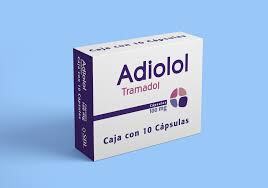Uncategorized
Adiolol Tramadol 100mg White Capsule: Uses, Benefits, and Side Effects
Adiolol Tramadol 100mg White Capsule, Adiolol Tramadol 100mg white capsule is a widely used medication for the treatment of moderate to severe pain. Whether you’re dealing with post-surgery pain, chronic conditions like arthritis, or acute injury-related pain, this medication can provide effective relief. Tramadol is a synthetic opioid that works by altering how your brain perceives pain, offering comfort to those in need of consistent pain management.
In this blog post, we’ll explore everything you need to know about Adiolol Tramadol 100mg white capsules, including their uses, benefits, side effects, and important safety tips.
What is Adiolol Tramadol 100mg?
Adiolol Tramadol is a brand of tramadol hydrochloride, an opioid analgesic commonly prescribed for pain relief. Each white capsule contains 100mg of tramadol, making it suitable for patients who require a more substantial dose of pain medication. The medication is typically used for short-term treatment of acute pain, but it may also be prescribed for long-term conditions under strict medical supervision.
How Does Adiolol Tramadol 100mg Work?
Tramadol works by binding to opioid receptors in the brain and spinal cord, which are responsible for transmitting pain signals. By doing this, Adiolol Tramadol changes how your brain perceives pain. It also affects serotonin and norepinephrine levels, which are chemicals in the brain that regulate mood and pain sensation. This dual action makes tramadol an effective pain reliever and mood enhancer.
Uses of Adiolol Tramadol 100mg White Capsule
Adiolol Tramadol 100mg capsules are prescribed for various types of pain, including:
- Post-surgical pain: After operations such as joint replacements or major surgeries, tramadol can help manage severe pain.
- Chronic pain conditions: For long-term issues such as osteoarthritis, back pain, or fibromyalgia, tramadol provides consistent relief when other painkillers fail.
- Injury-related pain: Tramadol is commonly prescribed after traumatic injuries like fractures or severe muscle strains.
The capsules are usually taken every 4 to 6 hours, depending on the severity of the pain, but your doctor will provide specific instructions tailored to your needs.
Benefits of Adiolol Tramadol 100mg
- Effective Pain Relief
The 100mg dosage of tramadol in Adiolol capsules is strong enough to manage moderate to severe pain, making it a useful option for patients in need of effective, long-lasting pain control. - Dual Action
Unlike traditional opioids, tramadol also affects neurotransmitters like serotonin and norepinephrine, helping improve mood and manage pain simultaneously. This can be particularly beneficial for people suffering from chronic pain, as it can help reduce feelings of discomfort and distress. - Lower Risk of Addiction
While tramadol is an opioid, it is considered to have a lower risk of addiction compared to stronger opioids like morphine or oxycodone. However, the risk still exists, so careful monitoring and proper usage are essential.
Common Side Effects of Adiolol Tramadol 100mg
While Adiolol Tramadol 100mg white capsules are effective at relieving pain, they also come with potential side effects. Most of these side effects are mild, but some may require medical attention.
- Dizziness and Drowsiness
One of the most common side effects of tramadol is dizziness or feeling light-headed. Many people also report drowsiness, which can affect their ability to concentrate and perform tasks like driving. - Nausea and Vomiting
Nausea is another frequent side effect, particularly when starting the medication. This can often be managed by taking the capsule with food. - Constipation
As with many opioid medications, tramadol can slow down bowel movements, leading to constipation. Drinking plenty of water and eating a fiber-rich diet can help alleviate this. - Headaches
Some users may experience headaches after taking tramadol. If this side effect persists or worsens, it’s important to speak to a healthcare provider.
Serious Side Effects and Warnings
Although tramadol is considered a safer alternative to stronger opioids, it can still cause serious side effects, particularly if not used correctly. These include:
- Seizures
Tramadol can lower the seizure threshold, making it more likely for people with a history of seizures or those taking medications that affect the brain to experience seizures. If you have a history of epilepsy, inform your doctor before taking Adiolol Tramadol. - Serotonin Syndrome
Since tramadol affects serotonin levels, it can lead to a condition called serotonin syndrome if taken in high doses or combined with other medications that increase serotonin. Symptoms include agitation, confusion, rapid heart rate, and muscle stiffness. This is a medical emergency and requires immediate attention. - Respiratory Depression
Tramadol can slow down breathing, especially when taken in higher doses or combined with other central nervous system depressants like alcohol or sedatives. If you notice shallow or difficulty breathing, seek medical help immediately.
Who Should Avoid Taking Adiolol Tramadol 100mg?
While Adiolol Tramadol 100mg is an effective pain management solution, it is not suitable for everyone. Avoid taking this medication if you:
- Have a history of seizures
- Are taking antidepressants or other medications that affect serotonin levels
- Have serious liver or kidney disease
- Are prone to opioid addiction
- Have severe respiratory issues like asthma or sleep apnea
Dosage and Administration
The typical dose of Adiolol Tramadol 100mg is one capsule every 4 to 6 hours, depending on the severity of pain. However, it’s crucial to follow your healthcare provider’s specific instructions. Never take more than the prescribed amount, as it increases the risk of side effects and potential overdose.
Conclusion
Adiolol Tramadol 100mg white capsules offer effective relief for moderate to severe pain, particularly for those who require a strong yet relatively safe opioid option. With its dual action on pain and mood, it stands out as a versatile pain management solution. However, like any opioid, it comes with potential risks, including side effects like dizziness, constipation, and more serious conditions like seizures or respiratory depression.

